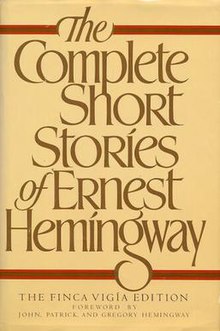The Complete Short Stories of Ernest Hemingway

First edition
|
|
| Author | Ernest Hemingway |
|---|---|
| Country | United States |
| Language | English |
| Genre | Short story anthology |
| Publisher | Scribner |
|
Publication date
|
1987 |
| Media type | |
The Complete Short Stories of Ernest Hemingway: The Finca Vigía Edition, is a posthumous collection of Ernest Hemingway's (July 21, 1899 – July 2, 1961) short fiction, published in 1987. It contains the classic First Forty-Nine Stories plus a number of other works and a foreword by his sons.
Only a small handful of stories published during Hemingway's lifetime are not included in The First Forty-Nine. Five stories were written concerning the Spanish Civil War: "The Denunciation", "The Butterfly and the Tank", "Night Before Battle", "Under The Ridge", and "Nobody Ever Dies". Excepting "Nobody Ever Dies", these stories were collected in a posthumous 1969 volume with his play, entitled The Fifth Column and Four Stories of the Spanish Civil War. Chicote's bar and the Hotel Florida in Madrid are recurrent settings in these stories.
In March 1951, Holiday magazine published two of Hemingway's short children's stories, "The Good Lion" and "The Faithful Bull". Two more short stories were to appear in Hemingway's lifetime: "Get A Seeing-Eyed Dog" and "A Man Of The World", both in the December 20, 1957 issue of the Atlantic Monthly.
The seven unpublished stories included in The Complete Short Stories of Ernest Hemingway: The Finca Vigía Edition are "A Train Trip", "The Porter", "Black Ass at the Cross Roads", "Landscape with Figures", "I Guess Everything Reminds You of Something", "Great News from the Mainland", and "The Strange Country".
In addition, this volume includes "An African Story", which was derived from the unfinished and heavily edited posthumous novel The Garden of Eden (1986), and two parts of the 1937 novel To Have And Have Not, "One Trip Across" (Cosmopolitan, May 1934) and "The Tradesman's Return" (Esquire, February 1936), in their original magazine versions.
The collection is not, despite the title, complete. After Hemingway's suicide, Scribner put out a collection called The Nick Adams Stories (1972) which contains many old stories already collected in The First Forty-Nine as well as some previously unpublished pieces (much of it material that Hemingway clearly rejected). From the new material, only "The Last Good Country" (part of an unfinished novella) and "Summer People" are included in this volume.
...
Wikipedia
